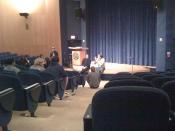A key feature of modern Australian society today is its multicultural background. Our society's multiculturalists like to pretend that we are colour blind and post racial (Moran 2011); and in doing so they pull a veil over the issue of racism. In the news article 'Is Australian Television Racist?' (Burt 2012), we are asked to look at the 'Aryan appetite' of our popular television programs, whereby minority. This essay will look at the way in which Australia has developed a 'new racism' of exclusionary tactics and how the diversity of our multicultural society is often overlooked (Cole 1997). For the purpose of this short essay I will use the program Home and Away as an illustration of the lack of cultural diversity in prime-time televising. Specifically we will look at the media's prime-time portrayal of our multicultural society and how it is very much and based on the idea that immigrants and ethnic minorities must be willing to assimilate to some degree in order to live happily in society.
Social changes that have ultimately shaped our postmodern society now mean that traditional way of forming a collective national identity is no longer a viable option. Postmodernism is typically the label placed upon our post-industrialised, post-world war two epoch in which changes in the labour market and globalisation meant an increase in migration (Abercrombie, Hill & Turner 2006). Changes have transformed our world. These changes, also including urbanisation and feminism have acted together to create an increasingly fragmented and individualised society. Anthony Moran (2011) would argue that this cultural diversity is a new feature of our national identity. Postmodern society shapes individuals who are in control of their own life choices, and therefore more 'at risk', and responsible for the decisions they make, including the bad ones (Beck & Beck-Gerrsheim 2003).


